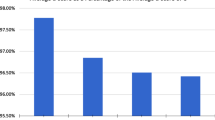Abstract
In this paper I examine Don Ross’s application of unificationism as a methodological criterion of theory appraisal in economics and cognitive science. Against Ross’s critique that explanations of the preference reversal phenomenon by the ‘heuristics and biases’ programme is ad hoc or ‘Ptolemaic’, I argue that the compatibility hypothesis, one of the explanations offerd by this programme, is theoretically and empirically well-motivated. A careful examination of this hypothesis suggests several strengths of a procedural approach to modelling cognitive processes underlying individual decision making, compared to a multiple-agent approach which Ross promotes. I argue that the debate between economists and psychologists are both theoretical and empirical, but cannot be resolved by appealing to the ideal of unification.
Similar content being viewed by others
References
Ainslie G. W. (2001) Breakdown of will. Cambridge University Press, Cambridge
Ainslie G. W. (2005) Précis of breakdown of will. Behavioral and Brain Sciences 28: 635–673
Fischer G. W., Hawkins S. A. (1993) Strategy compatibility, scale compatibility, and the prominence effect. Journal of Experimental Psychology: Human Perception and Performance 19(3): 580–597
Fudenberg D., Levine D. K. (2006) A dual self model of impulse control. American Economic Review 96(5): 1449–1476
Gintis H. (2009) The bounds of reason: Game theory and the unification of the behavioural sciences. Princeton University Press, Princeton
Gold N., List C. (2004) Framing as path dependence. Economics and Philosophy 20(2): 253–277
Goldstein W. M., Einhorn H. J. (1987) Expression theory of choice and the preference reversal phenomenon. Psychological Review 94: 236–254
Guala F. (2006) Has game theory been refuted?. The Journal of Philosophy 103(5): 239–263
Harrison G. W. (2008) Neuroeconomics: A critical reconsideration. Economics and Philosophy 24: 303–344
Harrison G. W., Lau M. I., Williams M. B. (2002) Estimating individual discount rates in Denmark: A field experiment. American Economic Review 92(5): 1606–1617
Kitcher P. (1981) Explanatory unification. Philosophy of Science 48: 507–531
Lakatos I. (1970) Falsification and the methodology of scientific research programmes. In: Lakatos I., Musgrave A. (eds) Criticism and the growth of knowledge. Cambridge University Press, Cambridge
Lichtenstein, S., & Slovic, P. (1973/2006), Response-induced reversals of preference in gambling: An extended replication in Las Vegas. Journal of Experimental Psychology 101: 16–20. (Pages refer to the reprinted version in Lichtenstein, S. & Slovic, P. (Eds.), The construction of preference. Cambridge: Cambridge University Press. pp. 69–76.)
Loomes G., Starmer C., Sugden R. (1991) Observing violations of transitivity by experimental methods. Econometrica 59(2): 425–439
Loomes G., Taylor C. (1992) Non-transitive preferences over gains and losses. Economic Journal 102(411): 357–365
Margolis H. (2007) Cognition and extended rational choice. Routledge, New York
McClure S. M., Laibson D. I., Loewenstein G., Cohen J. D. (2004) Separate neural systems value immediate and delayed monetary rewards. Science 306(5695): 503–507
Read D., Read N. L. (2004) Time discounting over the lifespan. Organizational Behavior and Human Decision Processes 94(1): 22–32
Ross D. (2005) Economic theory and cognitive science: Microexplanation. MIT Press, Cambridge, MA
Ross D. (2009) Integrating the dynamics of multiscale economic agency. In: Kincaid H., Ross D. (eds) The Oxford handbook of philosophy of economics. Oxford University Press, Oxford, pp 245–279
Ross D., Sharp C., Vuchinich R., Spurrett D. (2008) Midbrain mutiny: The picoeconomics and neuroeconomics of disordered gambling. MIT Press, Cambridge, MA
Rubinstein A. (2003) Economics and psychology”? The case of hyperbolic discounting. International Economic Review 44(4): 1207–1216
Rubinstein A. (2006) A sceptic’s comment on the study of economics. Economic Journal 116(510): C1–C9
Shafir E., Simonson I., Tversky A. (1993) Reason-based choice. Cognition 49: 11–36
Slovic P. (1975) Choice between equally valued alternatives. Journal of Experimental Psychology: Human Perception and Performance 1: 280–287
Slovic, P. (1995/2000). The construction of preference. American Psychologist, 50: 364–371. (Reprinted in Kahneman, D. & Tversky, A. (Eds.), Choices, values, and frames. Cambridge: Cambridge University Press. pp. 489–502).
Slovic, P., & Lichtenstein, S. (1968/2006). Relative importance of probabilities and payoffs in risk taking. Journal of Experimental Psychology Monograph 78(3) part 2: 1–18. (Pages refer to the version reprinted in Lichtenstein, S. & Slovic, P. (Eds.), The construction of preference. Cambridge: Cambridge University Press. pp. 41–51).
Slovic, P., Griffin, D., & Tversky, A. (1990/2002). Compatibility effects in judgements and choice. In Hogarth, R. (ed.), Insights in decision making: A tribute to Hillel J. Einhorn (pp. 5–27). Chicago: University of Chicago Press. (Pages refer to the version edited and reprinted in Gilovich, T., Griffin D. W., & Kahneman, D. (Eds.), Heuristics and biases: The psychology of intuitive judgement. Cambridge: Cambridge University Press. pp. 217–229).
Starmer C. (2000) Developments in non-expected utility theory: The hunt for a descriptive theory of choice under risk. Journal of Economic Literature 38: 332–382
Strotz R. H. (1955) Myopia and inconsistency in dynamic utility maximization. Review of Economic Studies 23: 165–180
Tversky, A., Sattath, S., & Slovic, P. (1988/2000). Contingent weighting in judgement and choice. Psychological Review 95(3): 371–384. (Pages refer to the reprinted version in Kahneman, D. & Tversky, A. (Eds.), Choices, values, and frames. Cambridge: Cambridge University Press. pp. 503–517).
Tversky A., Slovic P., Kahneman D. (1990) The causes of preference reversal. American Economic Review 80(1): 204–217
Tversky A., Thaler R. (1990) Anomalies: Preference reversals. The Journal of Economic Perspectives 4(2): 201–211
Wilcox N. T. (2008) Stochastic models for binary discrete choice under risk: A critical primer and econometric comparison. Research in Experimental Economics 12: 197–292
Wilkinson N. (2008) An introduction to behavioral economics. Palgrave Macmillan, New York
Author information
Authors and Affiliations
Corresponding author
Rights and permissions
About this article
Cite this article
Nagatsu, M. The limits of unification for theory appraisal: a case of economics and psychology. Synthese 190, 2267–2289 (2013). https://doi.org/10.1007/s11229-011-9971-z
Received:
Accepted:
Published:
Issue Date:
DOI: https://doi.org/10.1007/s11229-011-9971-z



